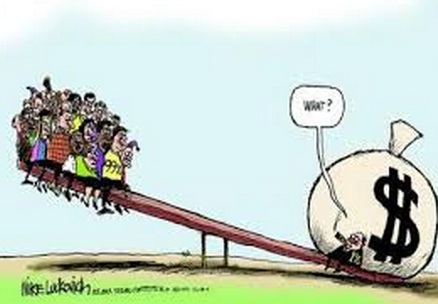Policies to aid in reducing the inequality index are varied. Some argue that growth is a way to even out incomes.
Steven J. Klees writes: There is ample reason to believe that the world will never grow its way out of inequality and poverty, and that redistribution is our only hope for greater social justice.
“Pro-growth is pro-poor” has been the informal slogan of the World Bank and the International Monetary Fund for decades, resulting in policies known as the “Washington Consensus.” These policies comprised the structural adjustment programs (SAPs) of the 1980s and 1990s, when developing countries were forced to cut social programs, privatize public services, deregulate industries, eliminate trade protection, and make their labor markets more “flexible” (a euphemism for making it easier to fire workers). These programs yielded modest growth at best; what they did succeed in boosting was poverty, inequality, and social protest.
Dissatisfaction with the Washington Consensus came to a head during the economic crisis in Southeast Asia in the late 1990s, leading to a search for alternatives. Since 2000, the Bank and the IMF have been forced to work with a new template, Poverty Reduction Strategy Processes (PRSPs), which supposedly differ from the SAPs in two ways; they put more importance on social safety nets, and they encourage extensive participation of civil society in decision-making.
Unfortunately, the PRSPs have failed to deliver. Their safety nets are full of holes, and, too often, civil society is barely consulted. Indeed, the 1,200-page technical manual that must be followed to produce a plan belies the fundamental idea that these programs are owned and governed by those who adopt them. In the end, PRSPs look a lot like SAPs.
Starting in the 1980s neoliberal economists began to dominate the discussion. They could not avoid talking about poverty, but inequality became an almost forbidden topic. The Nobel laureate economist Robert Lucas spoke for many when he dismissed the importance of inequality.
Fortunately, the pendulum has started to swing back. It is becoming increasing clear that the result of 35 years of pro-growth policies has been an almost unprecedented rise in income and wealth inequality.
Many are now arguing not only that economic growth does not in itself reduce poverty and inequality, but also that pro-equity policies and conditions lead to faster and better economic growth.
Indeed, some economists now argue for a two-pronged attack on inequality: redistributive measures alongside market interventions to bolster wages and employment. Among the recommended policies are progressive income taxes, increases in capital gains taxes, higher estate taxes, and global mechanisms to tax income, wealth, and financial transactions. Governments could also facilitate unionization to give workers more bargaining power, substantially raise minimum wages, and create employment, for example, through government jobs programs, as the United States did during the 1930s.
While Qureshi calls for economic growth to be “inclusive,” most of the policies he recommends fit more with the failed Washington Consensus than with the new directions proposed by resurgent progressive economists.
Pulling out of this tailspin will not be easy. It will require strong national and international governance. But, to borrow Thatcher’s old slogan, if we are serious about reducing poverty and inequality, “There is no alternative.”

